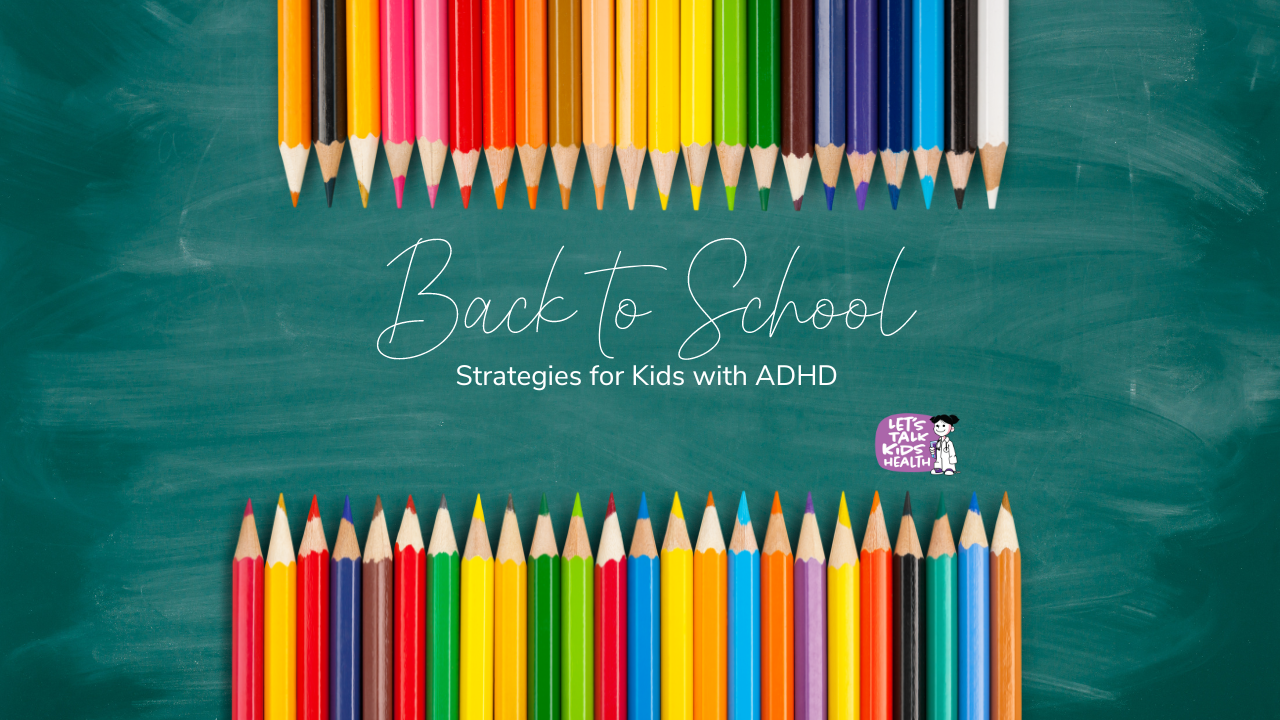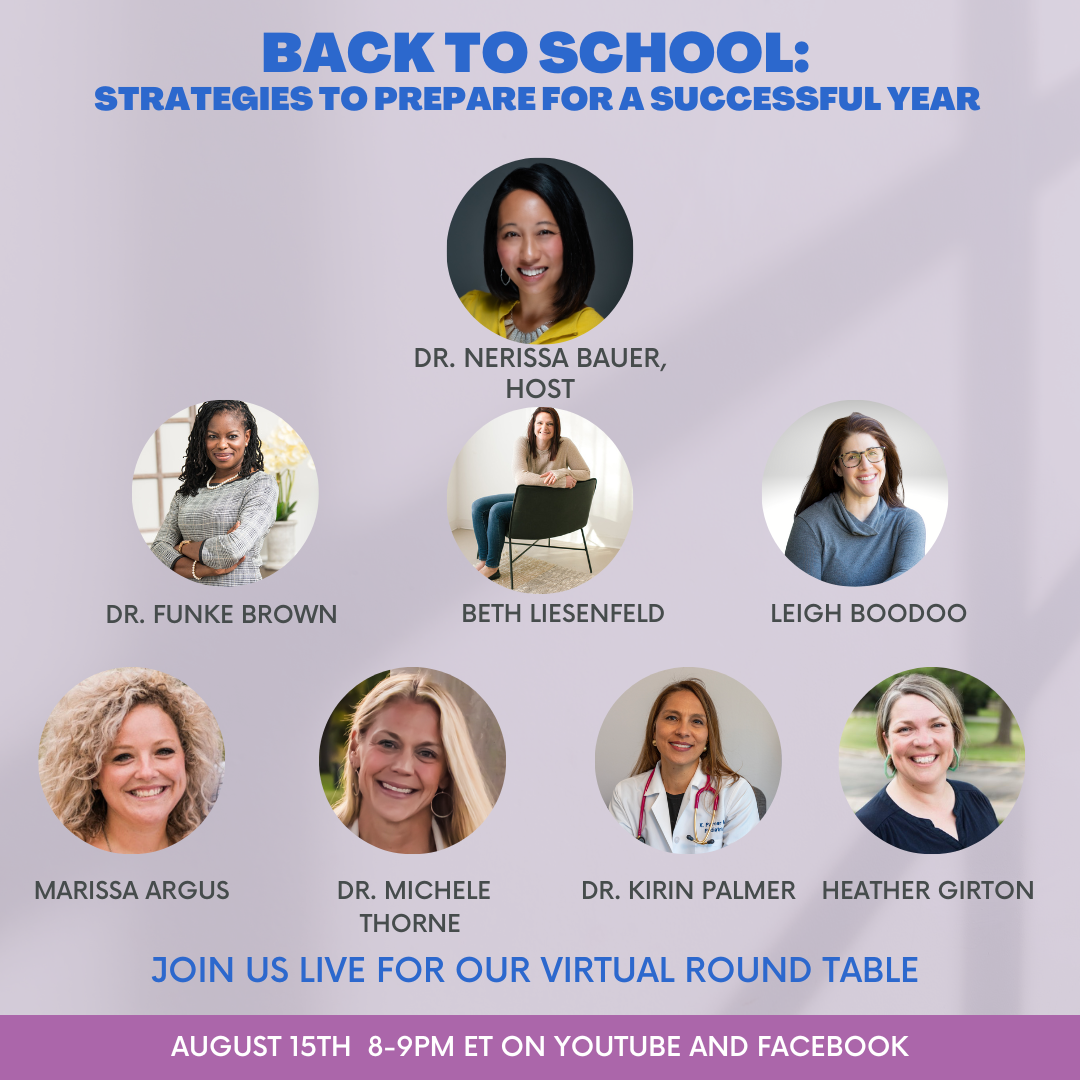Back to School Strategies for Kids with ADHD
Aug 07, 2022
Now that summer is quickly coming to an end, it's time to think about all the preparations for back to school. If you're a parent to a child with ADHD, here are some of my key back to school strategies to make this time go smoothly.
Keep in mind: ADHD is your child's superpower
Depending on where you are in your journey living with ADHD, it is important to remember this. When a child or individual receives a diagnosis of ADHD, kids and parents may feel a whole host of emotions including overwhelm, embarrassment, confusion, curiosity, sadness or relief. It is likely that your child may have gotten used to hearing things such as, "Why can't you remember to bring home things you need for homework?" or "Why didn't remember to turn it in?" or "How come I keep getting calls that you cannot keep hands to yourself?" or "Your teacher said that you were talking in class."
Taking time to learn about ADHD and helping others who come into contact with your child during their school day can be helpful so that everyone is on the same page. This also means talking with your child and having check ins as to how they are feeling when they come home from school. ADHD is a neurobehavioral disorder that affects how children think and learn. More broadly, ADHD affects executive functioning (a set of cognitive skills needed to carry out tasks and navigate daily life and includes self-control, working memory, planning and organization and flexible thinking). We need our executive function to be able to pay attention, start and maintain effort to finish tasks, tracking our actions, as well as prioritizing our time and staying organized).
As summer winds down, it is important to check in with your child a few weeks before school starts. Children may have different thoughts or feelings towards school and it can affect their mood, behavior and enthusiasm for the upcoming school year. Explore these feelings, positive and negative, and making time to understand their point of view. If you find your child has more negative feelings than positive ones, ask them to think about what they are good at or found interesting to learn about last year. Ask them about who they are excited to see on the first day of school. Helping your child to remember positive aspects about school or getting them excited about learning can be a useful way to lighten your child's mood and reframe their thoughts about school.
If you find your child is particularly down about themselves and what was hard about last year, you might want to turn the conversation towards helping them learn about ADHD. Roughly six million children have ever been diagnosed with ADHD between 2 and 17 years of age, which makes it common. One of my favorite ways to normalize having ADHD is by sharing with them positive role models and celebrities that have ADHD.
Invite them to write down any questions they have about ADHD so that the next time you visit your child's doctor, you can ask about it. If you find your child's mood or self-talk is consistently negative, make sure to talk with your child's doctor.
Helping our children learn more about what ADHD is and how it affects them day to day, while giving them practical strategies to work with their brains is empowering and helps them realize having ADHD is not "bad" but it is their superpower.
Don't forget the "R" word: ROUTINE
Chances are many families fell out of routine during the summer. However, children and teens thrive on consistency and routine. The start of a new school year can bring about stress due to uncertainty of what the teacher will be like or what subjects they will have to participate in or whether they will have friends in their class.
One way to combat stress and worry is to ensure your child is getting proper sleep. You may want to start 1 - 2 weeks before the start of school to gradually shift to earlier bedtimes and wake up times. Children who are between 6 to 12 years of age need at 9 to 12 hours of sleep. Teens need 8-10 hours of sleep each night.
Helping your child understand WHY they need good quality sleep is key. Instead of, "because I told you so" which can cause children to complain and flat out refuse, talk about their brain's need for sleep. Explain that during sleep, brains use that time to clean up and file things away that was learned or experienced so that the next time the brain needs to remember information, it can find it more easily. The brain also uses the time to formulate new solutions and work out problems that occurred during the day. Lastly, the brain gets to work on creating the essential neurotransmitters or "brain chemicals" it needs to focus and pay attention, boost our moods and communicate to the rest of our body.
When talking about sleep and getting enough of it, parents should remember to talk about screen-free time one hour or more before bedtime to help the brain wind down easier. Screens emit blue light and rapid or fast paced screen changes activate our brains. It is important to give our brains time to slow down and get ready for bed just like we do when doing our own bedtime routines.
Be proactive and plan with visuals or talking through a game plan
It helps to externalize information and put important things you want your child to remember in visual format.
- If your child is worried about what their teacher will be like...consider looking at the teacher's picture, bio and class webpage to learn more about him/her.
- If your child is worried about particular classes/subjects...get curious about these feelings. Use the phrase, "tell me more" to invite your child to open up about any concerns or worries they may have. If you have prior evidence of your child being able to learn hard or difficult subjects from the last school year, now would be the time to bring it out and show them.
- If your child is worried about whether they will have friends in their new class...talk about ways you can find out if a class roster is available, plan a playdate with an old friend, and talk through ways to meet new friends.
Give brains an extra nutritional advantage
Healthy nutrition is another aspect of ADHD treatment that often times doesn't get as much attention as other aspects. A common concern families usually report is whether or not a child is eating enough while taking medications for ADHD. However, nutrition is important for optimal brain and body health. Plus, I know some parents may prefer to try other options other than medicine first. There are two essential fatty acids necessary for health, omega 3 and omega 6. Omega 6 is found in corn, soybeans, nuts and seeds, meat, poultry, fish and eggs. Average diets contain many sources of omega 6 so supplementation is not usually necessary. However, omega 3 fatty acids found in fresh fish (such as salmon or tuna) and seafood nuts and seeds and plant based oils. Omega 3 and 6 helps our brain cells do what they need to do. Moreover, more than half the brain is made of fat, so ensuring regular intake of healthy fats is recommended. Research to date has shown small positive benefits among individuals with ADHD. Two main types of omega 3s are EPA and DHA that are the main fatty acids essential for brain health and daily functioning. GLA is another essential fatty acid that helps with decreasing overall inflammation but is only found in trace amounts in nuts and leafy greens.
Studies have shown children with ADHD usually have lower blood levels of omega 3s. There are studies showing benefits of omega 3 supplementation in children with ADHD that can lead to decreases in inattention, hyperactivity, and hostility and improve short-term memory. These are some of the areas individuals with ADHD can find difficult or challenging.
Helping kids get sources of omega 3 into their diets is a great way to supplement the overall ADHD Care plan. However, not all kids like to eat fish two or more times a week. That's where supplements come in! Not all supplements are the same and can have varying proportions of fatty acids. A newly available medical food, Equazen Pro, comes in a child-friendly jelly chew, free of added sugars and artificial ingredients. Plus it has the recommended ratio of EPA: DHA: GLA. Nutritional supplementation is a natural way to improve cognitive functions and helping children thrive and can be a useful adjunct to the overall ADHD Care Plan. Supplementation takes a minimum of 12 weeks to realize full potential. Studies are continuing in this area but show promise including greater improvements for children with mild symptoms and when used in combination with stimulant medications may allow for lower doses of stimulants. I've started taking these myself for the past month and really look forward to taking them every day. While I can swallow gel caps and such, I really have enjoyed these jelly chews and prefer them!
Other Key Strategies for Easing Start of School Transitions
- Visiting the school playground or driving by it to help them "see" where they will be going or requesting a tour. This is especially helpful for Kindergarteners, middle or high school students transitioning to a new environment or setting. Middle or high school students can benefit from walking their schedules and practice opening their lockers to alleviate first day of school jitters.
- Help your elementary child think about 1-2 fun facts or stories of what they did for the summer can alleviate stress or worry about what to talk about or share with peers or their teacher on the first day of school.
- Consider talking to your child's teacher and sharing your child's strengths and what has helped in the past. Many teachers are grateful for this insight as they are getting to know all the students in their classroom. These go-to facts can help set the stage for positive and collaborative communication with your child's teacher.
The transition to school can be stressful and exciting all at the same time. Being proactive and planning ahead for the upcoming school year can be helpful in easing the transition for both child and parent. Check out my upcoming back to school virtual round table live stream event happening on Monday August 15th at 7pm ET for a lively discussion. The replay will be available on my YouTube channel.

Join my Facebook Community to talk more about this blog post and get more parenting support!
Stay connected with news and updates!
Join my mailing list to receive parenting tips and resources, including information about my weekly Facebook Live guests and workshops.
And don't worry, your information will not be shared.
We all hate SPAM. So I promise to never sell your information, for any reason.

